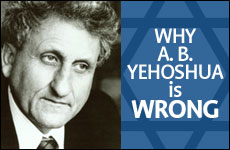 Vampire Weekend's Surprising Jewish Stories
Vampire Weekend's Surprising Jewish Stories


4 min read
3 min read
4 min read
5 min read
Maybe, just maybe, Judaism -- Jewish belief and practice as prescribed by the Jewish religious tradition -- is the key to Jewish continuity.
Quite a stir ensued at a recent American Jewish Committee symposium in Washington when Israeli novelist A.B.Yehoshua called the hosting organization's 100-year record "a great failure" and opined that Jews in the United States cannot live genuinely Jewish lives. Only in Israel, the celebrated writer asserted, can a truly Jewish life be expressed, and only the Jewish state can ensure the survival of the Jewish people.
Reaction was quick and spirited. Many of Yehoshua's American listeners were scandalized -- New Republic literary editor Leon Wieseltier accused him of "insist[ing] on narrowing [Jewish religion, culture and literature] down to Israeliness." And Israeli commentators took Yehoshua to task as well for, what the Jerusalem Post's Uri Dan characterized as, "the stupidity" of the novelist's remarks.
Citing the work of Israel Democracy Institute's Professor Aryeh Carmon, Forward editor J.J. Goldberg perceptively framed the brouhaha as the yield of a conceptual divide. With the destruction of Jewish Eastern Europe during the Holocaust, asserts Carmon, Israeli Jews "inherited" the Jewish identity expressed through daily life in an identifiably Jewish environment; and American Jews, the experience of Jewishness as a "way of looking at things."
Writes Goldberg: "It ought to be obvious... that Israelis are not wrong in their way of being Jewish, any more than Americans are wrong in their way -- joining organizations, attending events, giving to charities and trying to live by what they understand as Jewish values. The two ways are merely different."
Different, to be sure, but "merely" may not do justice to the yawning gulf between the two. More critical, though, the suggestion that either expression of Jewishness has lasting power is highly arguable.
Speaking Hebrew, having a Jewish army and living where the winter holiday is Chanuka and the spring one Passover are fine things, but to imagine they have the power to fuel Jewish continuity is to imagine that a shiny car without a motor can get you across town.
It doesn't take rocket science, only social science, to spy the implications of the large and increasing number of Israelis, mostly young, who have chosen in recent decades to emigrate. (New York and Los Angeles have particularly sizable Israeli expatriate communities, but most large American and European cities have their own healthy shares of once-Israeli residents.) Hebrew and army service are apparently insufficient to keep Israeli Jews in Israel; can they be expected to keep them vibrantly Jewish? And if Hebrew fluency is itself somehow the measure of Jewishness, the definition is as meaningless as it is tautological.
Nor is "American-style" Jewish cultural identity a bridge to our people's future. Not only is Hebrew Greek to most American Jews, but so are the most basic Jewish beliefs and concepts. Asked to name a Jewish tenet, the average American Jew is likely to respond "pluralism" or "repairing the world," even though his understandings of those concepts are bizarre expansions of how they are used in the Talmud. The true fundamentals of Jewish belief are books as closed to Joe Q. Jewish as the Talmud itself. Such obliviousness is hardly the stuff of generational continuity.
But continuity is attainable. The key is to recognize that there is a third heir to the Eastern European Jewish world that perished last century. It is neither Israel nor America, yet it resides, in fact thrives, in both countries -- as it does on other continents. It is the world of Jews who live neither Israeliness nor liberal idealism but Judaism – in the word's original sense: Jewish belief and practice as prescribed by the Jewish religious tradition.
Every Jew stood at Mt. Sinai, and every Jew today can return to it.
Not only is affirming and observing Torah and halacha the most authentic expression of Jewish nationhood, it is the one -- and only one -- proven to have empowered Jewish continuity in the past. And it is clearly poised to empower it in the future. The recent American Jewish Committee study showing a steep rise in the Orthodox percentage of young American Jews (and predicting a continuation of Orthodox growth) could not have come as a surprise to anyone remotely familiar with the multi-generational vibrancy of Jewish life in the many Orthodox Jewish enclaves across America.
The truism that Judaism underlies the Jews is often greeted with the blithe retort that observance simply "isn't for everyone." The Tel Avivian needs his nightlife, and the New York Jew his cultural relativism. How easily we turn wants into needs. And how easily we dismiss our past and forfeit our future out of fear that our styles may be cramped.
One need only enter almost any Orthodox synagogue to meet Jews from the most unusual backgrounds who, through force of determination and conviction, came to Jewish observance as adults. Every Jew stood at Mt. Sinai, and every Jew today can return to it. And all Jews -- in Israel, America, Europe and elsewhere -- who do so return, will, along with their children and descendents, become pulsating parts of the Jewish future.
